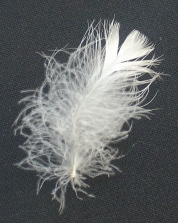 Those of us who are privileged wear our privilege like a feather; not like a feather in a cap or some showy accessory, but like a tiny feather left on our shoulder after we take off a down-filled winter coat. A feather we don’t notice, we didn’t put there, we don’t feel. A white feather. For us even to notice its presence requires a good look in the mirror (a mere glance typically won’t do it), or for someone to point it out for us. When we see it, this white feather, this privilege, we wonder who else noticed it. How long has it been there? Where did it come from? Why haven’t we noticed it before? Privilege is weightless for the privileged. Or, at least, privilege unnoticed, unnamed, or unaccepted is weightless for the privileged. Weightlessness is implicit to privilege because the weight of our privilege is being borne by those who aren’t. For them, our small, white, weightless feather carries the burdens of history, oppression, exclusion, and so much more. For them, the weight of our feather is often unbearable. So, what happens when we privileged start to understand this weight, even as we haven’t previously felt it or carried it for ourselves? When someone exposes our privilege, the weightlessness of that feather begins to change. When the social and cultural systems that have upheld our privilege and distributed its weight to others begin to evolve, that feather becomes a symbol of things we never knew or understood about ourselves. We feel embarrassed. Shamed. Confused. Indignant. Humbled. Angry. Lost. Defensive. The shifting of what was previously weightless can rattle the core identity of the white male who believes he is supposed to dominate politics, the boardroom, the factory floor, or household, but no longer feels so dominant. This shifting antagonizes and undermines the singularity of one religious narrative, creating space for other beliefs, valuing dialogue over dogma. It surfaces and challenges our judgment and pity of those less fortunate, those with disabilities, those with mental illness. Suddenly, this soft, feathery lightness of privilege rips violently at the meaning and history of our whiteness, maleness, faith, socio-economic status, gender identity, mental and physical abilities. It shakes our foundation, and we don’t typically like our foundation being shaken. After all, we are standing on it. And, when this happens, we privileged choose one of two paths forward: we grow and evolve given this enlightenment, rebuilding a broader and stronger foundation, or we retrench and defend our pre-enlightenment state and cling to our past, now fractured, foundation. The struggle between these two paths is real and is on display every day. Just watch the news. Listen to the political and economic discourse. Watch the rallies. Observe the angst in our own communities and schools. But, here’s the deal: denial of privilege is just that. It doesn’t make it not true. The feather is there. Most of us see it. And, yes, it is moving. The question is: will we privileged begin to shoulder its weight or use our privilege to continue to push that burden onto others?
3 Comments
Bren Elliott
10/3/2016 06:40:29 pm
Wow! Brilliantly and profoundly stated. Almost poetic in its clarity. Thanks for this thoughtful essay and an attempt to addres the cognitive discourse that is so present.
Reply
cornelia laux
10/4/2016 04:32:57 am
oh my, insightful , time for so many to question how the feather rests
Reply
Anderson
10/6/2016 07:19:09 am
I just wanted this comment that was sent to me via email added to the queue here. It's a very powerful next level of this discussion offered by one of the true leaders and pioneers in youth/justice work Karen Pittman: "Powerful words for all of us. White males clearly have the lightest, whitest feathers, but all of us who have had some weight lifted off of our shoulders over the generations, through greater access to education, financing or power, have feathers to acknowledge. They may be thicker and darker, but they are there."
Reply
Leave a Reply. |
Categories
All
Archives
April 2024
|
 RSS Feed
RSS Feed